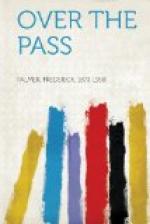He asked about carpenters and laborers; he chose the site for his house; he plotted the walks and orchards. She could not refuse her advice. Who can about the planning of new houses and gardens? He had everything quite settled except the land grant from the Doge when they started back; while the sun, with the swift passage of time in such fascinating diversion, had swung low in its ellipse. When they reached the main street the Doge was on the porch passing his opinion on the Eternal Painter’s evening work.
“Some very remarkable purples to-night, I admit, Your Majesty, without any intention of giving you too good an opinion of yourself; but otherwise, you are not up to your mark. There must have been a downpour in the rainy world on the other side of the Sierras that moistened your pigments. Next thing we know you will be turning water-colorist!” he was saying, when he heard Jack’s voice.
“Here’s a new settler!” Jack called. “I am going to stay in Little Rivers and win all the prizes.”
“You are joking!” gasped the Doge.
“Not joking,” said Jack. “I want to close the bargain to-night.”
“You bring color and adventure—yes! I did not expect the honor—the town will be delighted! I am overwhelmed! Will you plow with Pete Leddy’s gun drawn by Wrath of God, sir, and harrow with your spurs drawn by Jag Ear? Shall you make a specialty of olives? Do you dare to aspire as high as dates?”
The Doge’s speech had begun incoherently, but steadied into rallying humor at the close.
“I haven’t seen the date-tree yet,” said Jack. “Not until I have can I judge whether or not I shall dare to rival the lord of the manor in his own specialty. And there are business details which I must settle with you, O Doge of this city of slender canals!”
“O youth, will you tarry with peace between wars?” answered the Doge, in quick response to the spirit of nonsense as a basis for their new relations. “Come, and I will show you our noblest product of peace, the Date-Tree Wonderful!” he said, leading the way to the garden, while Mary hurried rather precipitately into the house.
Jasper Ewold was at his best, a glowing husbandman, when he pointed aloft to the clusters of fruit pendent from the crotches of the stiff branches, enclosed in cloth bags to keep them free of insects.
“Do you see strange lettering on the cloth?” he asked.
“Yes, it looks like Arabic.”
“So it is! Among other futile diversions in a past incarnation I studied Arabic a little, and I still have my lexicon. Perhaps my construction might not please the grammarians of classic Bagdad, but the sentiment is there safe enough in the language of the mother romance world of the date: ‘All hail, first-born of our Western desert fecundity!’ It is calling out to the pass and the range from the wastes where the sagebrush has had its own way since the great stir that there was in the world at genesis.”




